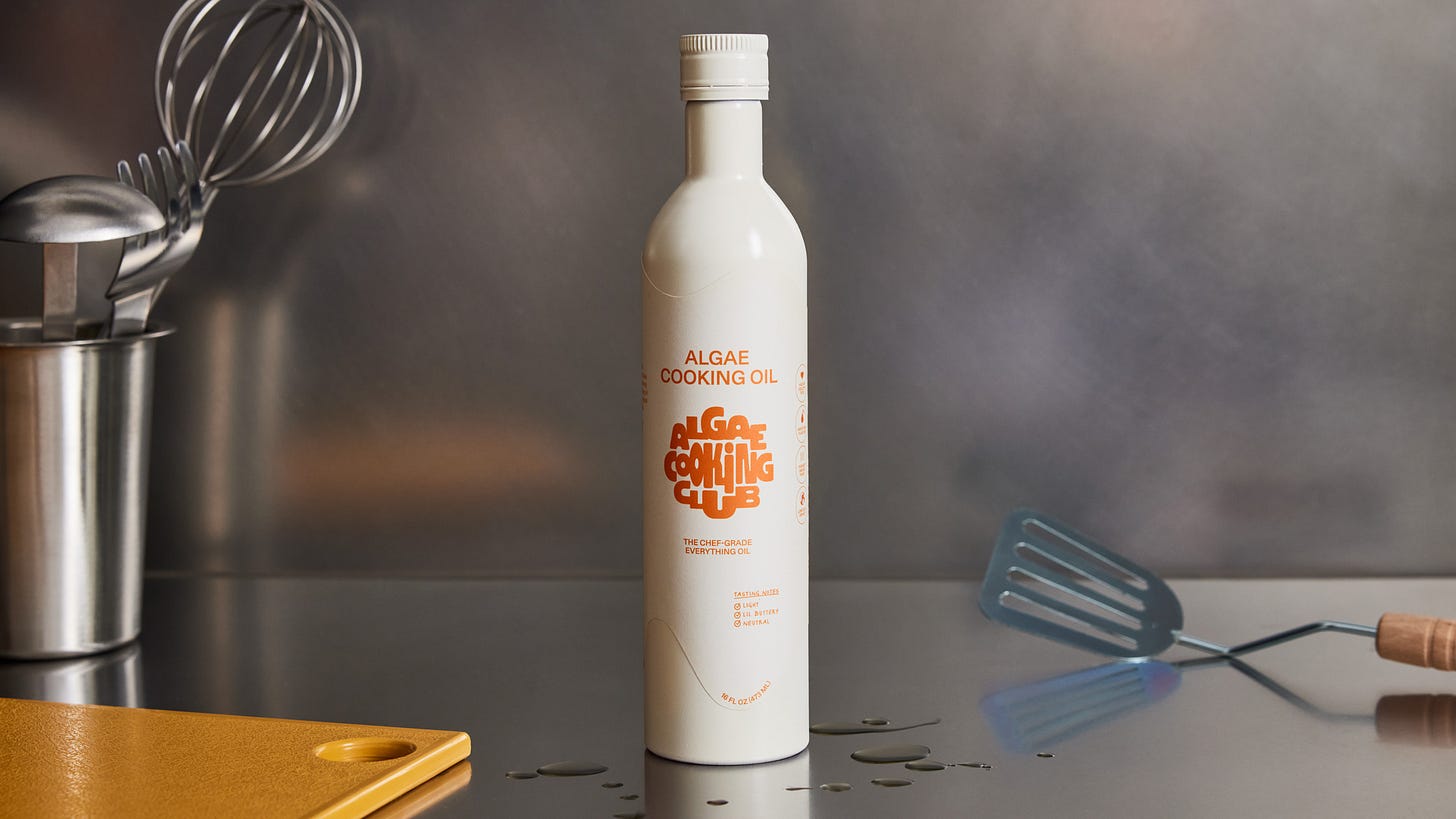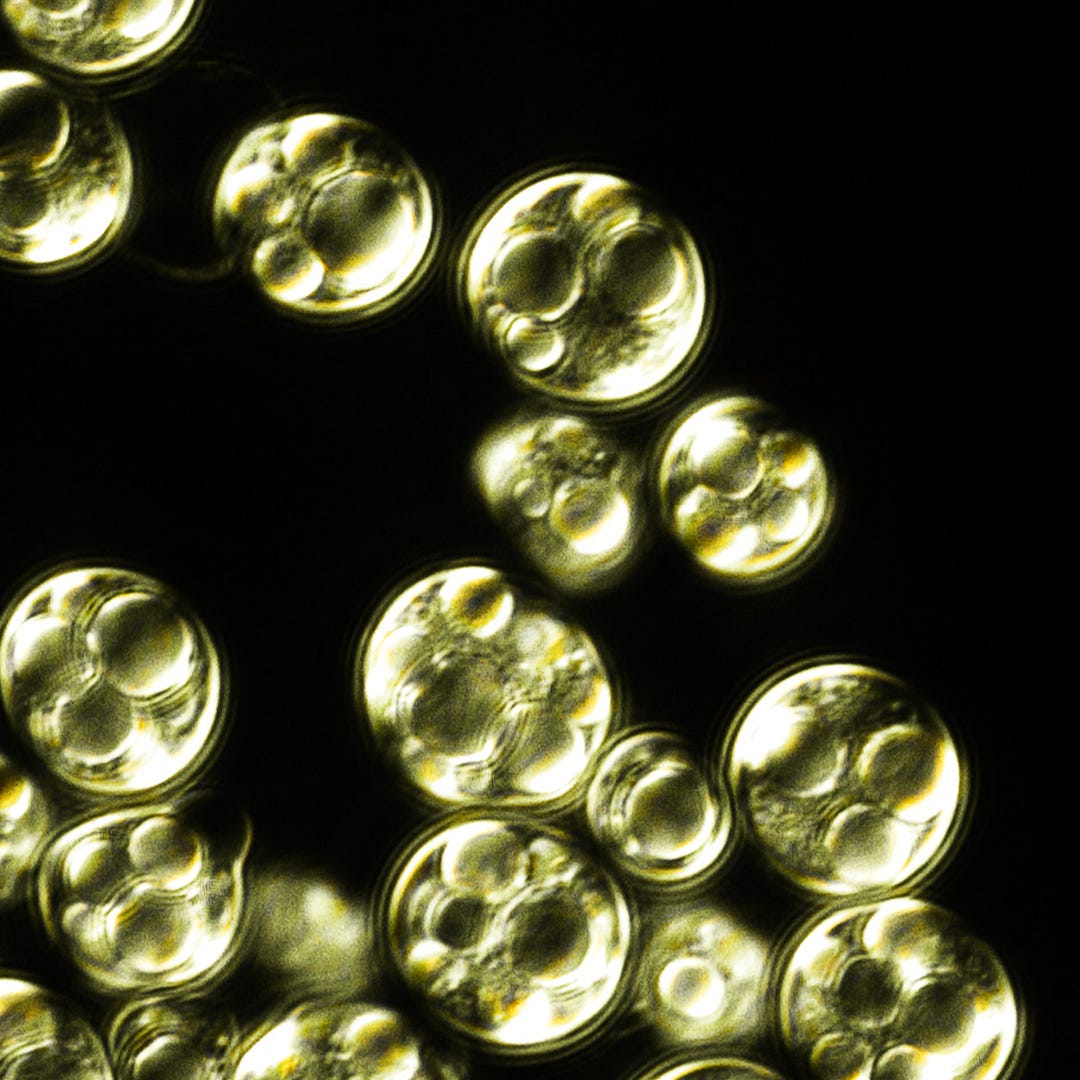Algae Cooking Club is more than just a flash in the pan
A cute new cooking oil (yes it's cute!) that’s neutral, stable, good for you and the environment.
I’m not sure I’d ever considered an oil made from algae before, but then a few months ago a friend told me about Algae Cooking Club, a new-ish all-purpose algae-derived cooking oil that she said was amazing.
Cooking oil made from algae seemed, well, kind of odd to me, but then you know, pressing oil from seeds was not exactly winning for the environment so I decided to try it and dig into what this new-fangled oil was all about. What I discovered was that I loved cooking with it, and that it was really good for me (high in good fats!) and for the earth (seed-, hexane-, and glyphosate-free, and half the carbon footprint of avocado, canola and expeller-pressed seed oils). And now, I’m hooked. And you can be too! At the end of this post, there’s a code for Strong Buzz readers—that means you—to get 15% off so you can give it a swirl.
What’s great about Algae Cooking Club oil? Glad you asked. First off, this glossy, clear oil has a super high smoke point: 525°F, which is roughly 125°F higher than olive oil and 5 times the oxidative stability of avocado oil. So you can sear and sauté beautifully.
Also, it’s rich in those good-for-you Omega-9 monounsaturated fats; it’s got 25% more than olive and avocado oils, and 75% less saturated fat (bad fats!) compared to olive and avocado oil. It’s also really versatile: I used it to make scrambled eggs, to sear fish, to roast a chicken, and to make banana bread.
This last bit is quite significant: the oil is seed-free, glyphosate-free (glyphosate is the active ingredient in most Roundup® brand herbicides and other weed-control products), hexane-free (hexane is a toxic chemical that’s used in solvents to extract vegetable oils from seed crops such as soybeans), has a completely clean fermentation process, a low carbon footprint, and is not farmed. All excellent for our Mother Earth.
As you probably have read by now, seed oils, like canola, sunflower, grapeseed, corn, and soybean, are problematic for people and the earth for a number of reasons. They are high in omega-6 fatty acids, which can cause inflammation and increase blood pressure. They can also oxidize, which creates free radicals that damage cells and tissues and can lead to an imbalance with antioxidants in the body, which leads to cellular damage and chronic diseases like cancer, diabetes, and cardiovascular disease.
That’s just what they can do to your body. What they do to the earth is equally alarming. Vegetable oil crops, which are used to make seed oils, are two of the top three drivers of global deforestation. They are also cheap and can be refined with a lot of heat and pressure, which can make them inflammatory. So this seed-free oil is really a game changer.
Algae Cooking Club’s founder Kas Saidi spent his career working on developing foods for Squared Circles, a venture studio built to invest in ingredients that are healthier, tastier and better for the planet. “I am not the healthiest person on the planet, but I didn’t want to be putting canola oil in my body so regularly. I wanted to find a better healthier cooking oil. Algae checks those three boxes. It is stable and not oxidative; it has a high smoke point, it is super clean, super neutral, and it uses a fraction of energy and water to produce. It’s almost too good to be true.”
Algae Cooking Club Oil is made from terrestrial algae, a land-based algae first discovered on a chestnut tree; it’s not the sort you might think of when you think of algae growing on a pond. Kas explains that this terrestrial microalgae is sort of like a sourdough starter; once you have it, you keep feeding it and it just replicates itself. The great thing about this: the company is not depleting any natural resource.
To make the oil, microalgae are placed in a big stainless steel fermentation tank where it is fed sugar. Over three days, the algae is slowly converted to oil. “You don't have to harvest, expel it, press it and package it. You don’t have to wait an entire season for a crop to be harvested that is not really great at creating oil,” says Kas. “A sunflower or a grapeseed doesn't have a ton of oil in it, so it requires a ton of energy to extract that oil. Algae is 80% oil by weight so you can create high quality and high volume of oil, lighter on land and water and energy use.”
The only downside of the oil at the moment is the price; it is $19.99, but the price will continue to drop (it started at $25 at launch in 2023) as the company scales up. “We are a tiny company and cheap oils have a massive supply chain and efficiencies that we don't have,” says Kas.
While its price might make using this oil for deep-frying cost-prohibitive, I love it for general everyday cooking. It is silky and glossy and perfect for crisping up salmon when I sear fish or a giving a steak a nice little crust (the 535F smoke point is amazing). You can add a drizzle to a smoothie for some extra healthy fats, whisk it into a punchy vinaigrette, or add a glug to your breakfast pan for frying and scrambling morning eggs. It’s also great for baking because it is neutral; it doesn’t have a flavor like avocado oil or olive oil.
The team is already working on new Algae Oil products; come October, with EMP’s Daniel Humm who’s a chef ambassador, they’ll be releasing two finishing oils: one infused with gochugaru chiles and another with garlic and shiitake mushrooms.
Wanna give it a try? Just drop the code Strongbuzz in at checkout and get 15% off!








A very interesting and compelling article, Andrea! I'm definitely convinced to give it a try!